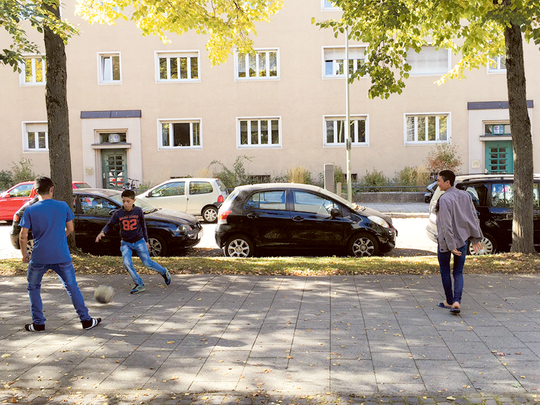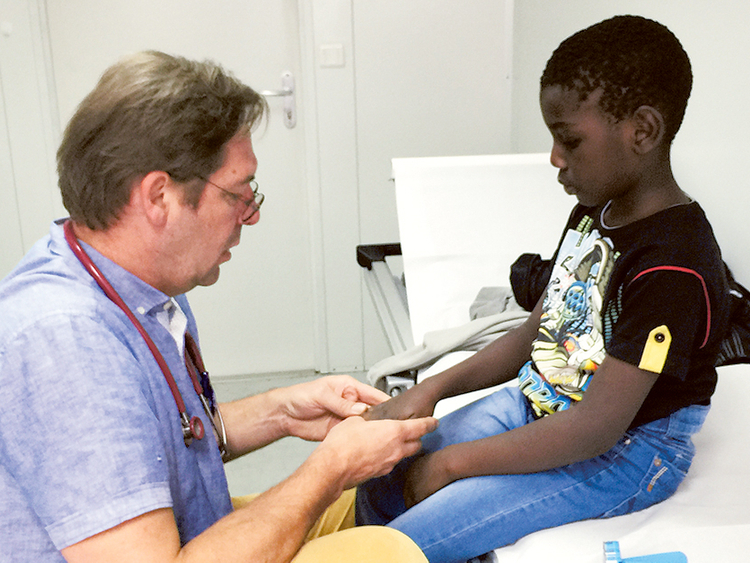
Munich: As you enter the blue concrete dorm building run by Caritas for unaccompanied minor refugees, in the heart of the Munich city, the rustic beat of a Pashtun song greets you in the hallway.
Huddling on a couch at the entrance of an indoor volleyball court, Jaan Mohammad, 14, from Afghanistan is flipping through his mobile playing his favourite songs.
Abdullah from Somalia and Kondus from Eritrea, boys of similar age, join him whistling to the tune. Soon the group swells to a dozen or more, and there is lot of hooting, laughing and name-calling.
Otherwise complete strangers, who do not even speak a common language, these boys who have now found a home in Germany are bonded by an agonising past they have left behind and their hope for a new future.
Sent away by their parents to escape the horrors of their homeland, or having made their way to the shores of Europe on their own after losing their families to war and violence, these refugee boys are trying to find their feet in a foreign land.
Alone and afraid, they only have their teenage grit and determination to fall back on.
Mohammad, who lost his father in a bomb attack, said he had to survive 14 days with hardly any food and water during the long trek from Afghanistan to Turkey, Greece and then into Hungary before finally crossing the borders with Austria and Germany.
“I was crammed onto a truck with several others for many days. I was hungry but when I asked for food, the men who took me kicked me and asked me to shut up. They dropped us off somewhere in Hungary. I do not remember how long I walked or for how many days to finally take a train from Austria to Germany,” Mohammad told Gulf News.
After an initial medical check up at the Central Railway station, he was brought to the Clearing House by German welfare officials.
But now living in a foreign land, the teenager wants to make a new start and forget about his bitter past.
“I want to go to school and become an engineer. I want to live a peaceful life in Germany,” said Mohammad.
Fourteen-year-old Gulam Sahi was also forced to flee his home in Afghanistan after his house was destroyed in Taliban bombing.
“My father lost both his legs and he cannot work. He took me aside one day and told me I have to find a way out of Kabul if I want a better future.”
Sahi was smuggled out of Afghanistan to Turkey and then Greece by human traffickers. But after an arduous trip by sea and land that finally got him to Germany by train from Austria, the boy says he is clueless what kind of life is awaiting him.
“I feel like I am staring at a blank space. I cannot sleep at night. Sometimes, I lay awake all night and wonder where I have ended up,” Sahi told this reporter.
“When I call my father, he tells me not to give up hope but study German and try to find a job. But I know nobody here,” Sahi says.
For the more than 30 unaccompanied minor refugee boys — mainly from war-torn countries like Iraq, Afghanistan, Syria, Sudan, Somalia and Eritrea — who are living in this Clearing House run by Caritas, learning a new language is a welcome distraction from a monotonous routine.
“There is nothing much to do here. Sometimes I get bored. I can speak a little bit of English but other boys cannot,” said Abdullah from Somalia.
He is taking German language lessons along with others.
“German sounded very weird to me in the beginning. But now I can understand a few words,” said Abdullah who has been staying in Munich for three months.
And when they are not studying, the boys spend time playing football, listening to music, doing yoga or simply loitering around in the hallways waiting for their next meal.
Jeannette Schmidt, head of the Clearing House said while some boys are quick to adjust to their new surroundings, others are still traumatised from their past, and show aggressive behaviour.
“Some children still get nightmares and cannot sleep at night. Some are afraid to share rooms with others and want to be alone. We have social workers and psychiatrists visiting our facility to help these boys cope,” Schmidt said.
The Clearing House has the capacity to accommodate around 60 children. But with four to five new unaccompanied minor refugees being brought in, Schmidt feels they will soon exceed that number.
“We have only a couple of teachers and volunteers here. The number of young refugees arriving in Germany is the highest this year, and we have to find a way to cope with the influx,” she said.
Since January, it is estimated that more than 6,000 children have made their way to Germany without parents, and hundreds more are adding to the refugee influx.
In 2014, Germany registered over 11,500 unaccompanied minors, according to government figures. This was an increase of 5,000 from the previous year.
Estimates by international aid organisations suggests that between 4 and 7 per cent of the approximately 700,000 asylum applications made in Europe this year are from unaccompanied minors.
As their numbers are spiralling, Schmidt says government and social organisations are trying to ease the crisis by speeding up the process of finding foster homes or boarding schools for them.
“Currently, these boys stay here between three to eight months before they can be moved to foster homes elsewhere in Germany,” she said.
But for most of these children, what happens tomorrow in an alien land is a question they don’t want to be bothered with.
“I don’t know what there is for tomorrow. I am happy that today I have food to eat, and a bed to sleep,” says Abdul Ahmadi, 14, from Syria.













